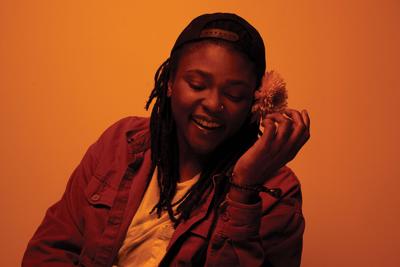
Joy Oladokun
When an artist releases a new record, there are typically a number of emotions at play: happiness, excitement, anxiety, perhaps a little sadness at the thought of letting go of a project that may have taken years to create. For Joy Oladokun, who released her new album Proof of Life April 28, the experience included a bit of all of the above.
“It’s a really personal body of work at a really interesting time, honestly, even in Nashville,” Oladokun tells the Scene. “So there was an anxiety I had for a little bit. ‘Does anybody even care? Is this any good?’ It helps to put it out into the world and let people respond. I also have my own moment of appreciation for it.”
Over the course of a half-hour phone interview, though, two feelings seem especially present for Oladokun: gratitude and relief. Oladokun wrote the bulk of Proof of Life — which serves up a truly singular blend of folk, power pop and indie rock — during the darker days of the COVID-19 pandemic. She’s happy not just that the wait is finally over, but that her new music is broadening her own community of like-minded listeners and folks with similar backgrounds.
“Seeing what people respond to, it’s like, ‘Oh, I’m not alone.’ So I’ve been trying to be really intentional, for whoever is listening to it and engaging with it, to be as grateful as I can. I was trying to pin this feeling down before it came out, and I think it was just anticipation for that connection. Because it is something that sits in isolation for so long.”
Our conversation takes place just a few days after Proof of Life’s release, and a few days before a release show at Brooklyn Bowl. The Nashville-based singer-songwriter — who moved here from Arizona and is a child of Nigerian immigrants — returned to the States after time in Europe. She’s calling from New York, speaking while having makeup done for an appearance on The Late Show With Stephen Colbert later in the day. She will perform “Somebody Like Me,” which is among the more powerful songs on an album that packs a wallop throughout.
Proof of Life was a collaborative effort, which Oladokun co-produced along with Mike Elizondo, Ian Fitchuk, Dan Wilson (who you’ll know from Trip Shakespeare and Semisonic) and Alysa Vanderheym. Guests on the record include rockers Manchester Orchestra, country star Chris Stapleton and rapper Maxo Kream. It’s fitting that Oladokun tapped a broad and eclectic roster of collaborators, as she feels that there’s something for everyone on Proof of Life.
“Every song is different,” she explains. “The idea is for everyone to find their vibe and just live in it.”
Those differences span a number of genres, with Oladokun’s narrative perspective and preternatural sense of melody bringing a sense of cohesion to the wide-ranging collection of songs. Opener “Keeping the Light On” pairs a hooky chorus with textured production, its message championing hope in times of darkness. “We’re All Gonna Die,” a collaboration with songsmith Noah Kahan, doesn’t celebrate mortality so much as acknowledge the freedom that comes with accepting it. And the aforementioned “Somebody Like Me” directly addresses Oladokun’s feelings of being an outsider: “Can anybody say a prayer? / Can anybody light a candle / For somebody like me? / It’s the least that God could do / For giving more than He could handle / To somebody like me.”
“I had a moment of recognizing that, as a Black queer person, I represent a challenge to people who say they represent one thing and do another,” Oladokun says of “Somebody Like Me,” which also addresses religious hypocrisy. “I’ve known I was queer since I was 8 years old, then I’d go to church on Sunday and hear someone be homophobic for 90 minutes for no reason. The reality is, if God exists, there’s no actual way they give a fuck about who I kiss. I think they care about how I treat them.”
At the top of our conversation, Oladokun explains that she’s been engrossed in a Netflix series called The Playbook. In it, legendary sports coaches like Dawn Staley and Doc Rivers share insight into their personal and professional successes. The words of Staley, a Hall of Fame basketball player and legendary NCAA coach, rang especially true.
“She talks about this ‘creating a home-court advantage’ idea,” Oladokun says. “Especially being queer and Black in Nashville, I feel isolated in my brain a lot of times. So the gift of being able to put the record out and also see what people are responding to is also a way to feel like, ‘Oh, I’m not alone.’”
A true believer in the album format, Oladokun also hopes listeners will sit down and experience Proof of Life as she intended for it to be heard: from start to finish, in one sitting. She’s already seen this from some fans, like one who shared on Twitter that they listened to the LP while FaceTiming with their brother.
“That just meant a lot. It’s kind of a surprise, people’s investment and their appreciation. Sometimes you hear, ‘I’m gonna listen to your record,’ and then you never hear back. It’s cool to hear back from people who are like, ‘I had a really cool experience listening to the album as a whole.’ It means a lot to me, that that’s what people are taking away. There’s no guarantee for how people will experience a final piece of work.”









